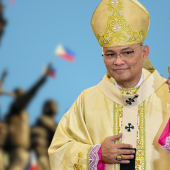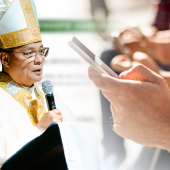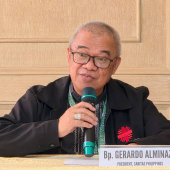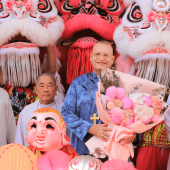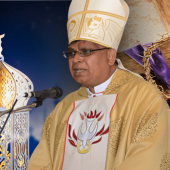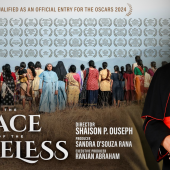Holding Rosary, Filipinos Unite in a National Day of Prayer and Public Repentance
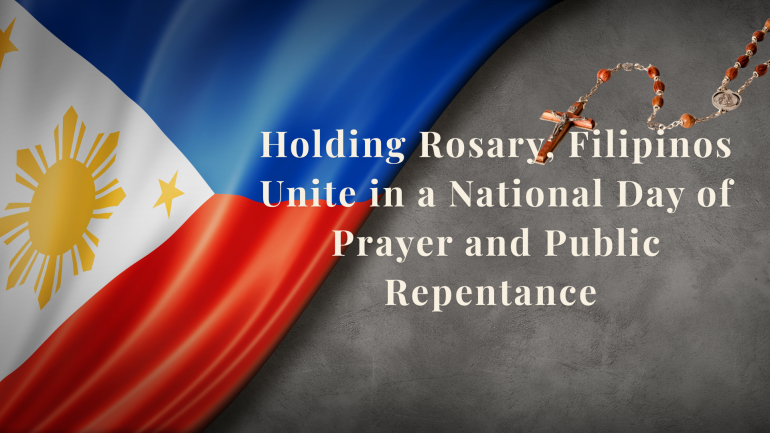
Catholic communities across the Philippines will unite in prayer and repentance on October 7, 2025, as the nation observes the National Day of Prayer and Public Repentance, a collective act of faith and humility called by the Catholic Bishops’ Conference of the Philippines (CBCP).
The observance, which coincides with the Feast of Our Lady of the Most Holy Rosary, holds a deeply symbolic meaning for a nation long known as “Pueblo Amante de María”, people in love with Mary. Filipinos are encouraged to pray the Holy Rosary, offer acts of penance, and attend Holy Masses as they implore God’s mercy and healing for their country.
The CBCP, led by its president Bishop Pablo Virgilio Cardinal David, issued a statement last week urging all public officials to uphold integrity amid growing concerns over corruption in national infrastructure projects. Alongside its call for truth and accountability, the bishops also invited the faithful to turn to prayer and conversion.
“This is a defining moment for public accountability,” Cardinal David said in the statement. “A nation cannot heal when its moral arteries are clogged by corruption and self-interest. Only through truth can our nation begin to rebuild trust.”
The bishops called on every diocese and parish to mark October 7 as a sacred day of prayer and public repentance, emphasizing that “the Filipino people are watching closely” and that healing must begin both in governance and in the hearts of the faithful.
Responding to this national call, dioceses throughout the Philippines have released circulars outlining how the faithful will observe the day. In the Diocese of Cubao, Bishop Elias L. Ayuban, Jr., CMF, DD, strongly urged all parishes, schools, and lay associations to participate actively through communal acts of prayer and reparation.
“We must unite our prayers, penance, and conversion of heart for the healing and renewal of our land,” Bishop Ayuban said. “Let us take this call by heart, not as a mere symbolic gesture, but as a genuine moment of spiritual renewal and solidarity.”
Among the key observances encouraged are the celebration of the Holy Eucharist for the nation’s healing, the praying of the Rosary in homes and churches, Eucharistic adoration, fasting, and acts of personal sacrifice. Churches will also toll their bells at 8:00 PM daily until the Feast of Christ the King on November 23, as a sign of mourning and prayer for those who have suffered from calamities and corruption.
A special prayer titled “A National Cry for Mercy and Renewal” will also be prayed in all parishes every Sunday leading up to Christ the King.
The timing of the National Day of Prayer, falling on the Feast of Our Lady of the Rosary serves as a reminder of the country’s enduring Marian devotion. It recalls the victory of the Christian faithful at the Battle of Lepanto in 1571, attributed to the power of the Rosary.
In Filipino tradition, Mary has always been seen as a mother who intercedes for her people in times of crisis, from wars and natural disasters to moments of moral confusion. Today, she is once again invoked as the nation faces both corruption and calamities.
For many Filipino Catholics, praying the Rosary is not merely a form of devotion but a way of remembering the life of Christ. “The Rosary tells the story of God’s life, a story that reminds us that despite suffering and darkness, there will always be resurrection and light,” shared Kristine Martillano, a volunteer lector from Our Lady of Pentecost Parish, under the Diocese of Cubao.
She reflected that the nation’s challenges mirror the Lord’s own suffering, yet they also remind the faithful that “God is with us through it all; we only need to pray, trust, and keep our faith strong, believing that His light and love will prevail.”
Kristine also compared the comfort found in prayer to the love of a mother. “When we get sick, the first person we call is our mother,” she said. “Having another Mother in Our Lady gives comfort, knowing that she watches over us and prays with us.” She added that Mary’s faith and courage in saying “yes” to God serve as a reminder for all believers to trust God’s plan completely.
Across Asia, the Philippine Church’s observance of the National Day of Prayer and Public Repentance also serves as a witness to other nations where faith and social challenges often intertwine. The bishops’ call reflects the belief that true national reform begins not merely in systems and laws but in the renewal of hearts.
For millions of Filipino Catholics at home and abroad, the observance is a moment to remember that prayer and repentance are powerful tools of transformation.
As bells ring, candles are lit, and rosaries are prayed throughout the archipelago, the call of the bishops resounds clearly: “If my people humble themselves and pray, and seek my face and turn from their wicked ways, then I will hear from heaven and heal their land” (2 Chronicles 7:14).
On the Feast of the Holy Rosary, the people of the Philippines once again turn to Mary, the Mother of God and Queen of Peace, asking her to intercede for her beloved nation, that truth may triumph over corruption and that healing may come to her children.
(Leahna Villajos, currently serving as the Social Media Officer at the Roman Catholic Diocese of Cubao, Philippines, is also a freelancer who contributes regularly to RVA and other Catholic platforms.)
Radio Veritas Asia (RVA), a media platform of the Catholic Church, aims to share Christ. RVA started in 1969 as a continental Catholic radio station to serve Asian countries in their respective local language, thus earning the tag “the Voice of Asian Christianity.” Responding to the emerging context, RVA embraced media platforms to connect with the global Asian audience via its 21 language websites and various social media platforms.









